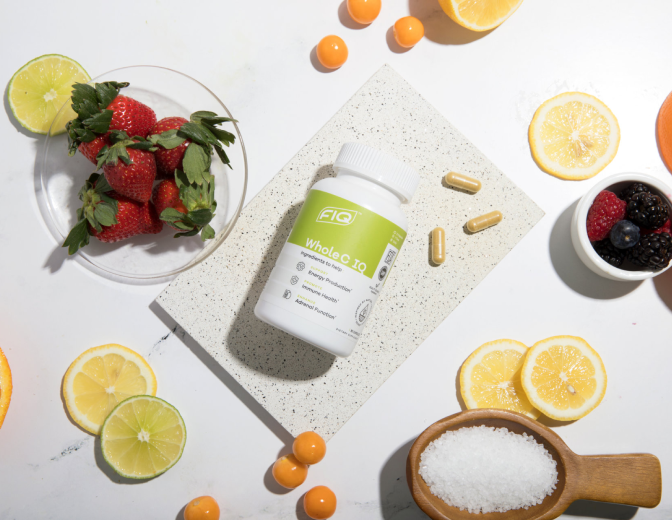Here’s a non-exhaustive list of the metabolic processes that the liver is responsible for: (1)
- Metabolizes all nutrients absorbed in the gastrointestinal tract prior to sending them out systemically.
- It stores fat-soluble vitamins and regulates their absorption rate from the gut.
- Produces and filters bile for fat digestion.
- Converts various hormones and vitamins to their active forms.
- Produces nearly all serum proteins found in the blood.
- Clears out drugs, hormones, and toxins from circulation to prevent build-up in the body.
- Produces cholesterol.
- Makes glucose to regulate blood sugar levels when fasted.
- Produces inflammatory signals.
Problems with an Unhealthy Liver
Despite being highly regenerative, the liver's rapid metabolic function makes it susceptible to damage. This can lead to metabolic diseases like insulin resistance, diabetes, dyslipidemia, cardiovascular disease, and kidney problems (4).What was once referred to as non-alcoholic fatty liver disease (NAFLD) is now being termed metabolic-associated fatty liver disease (MAFLD) (4). Liver disease was once really only observed as a consequence of heavy alcohol consumption that resulted in steatosis or scarring of the liver tissues, impairing its functions.
In recent years, more and more people have been presenting similar liver scaring without heavy alcohol consumption, thus the term NAFLD. Research has shown that NAFLD results from metabolic imbalances caused by Westernized diets and sedentary lifestyles. (4) Risk factors for NAFLD are: (5)
- Low Hdl
- High triglycerides
- Metabolic syndrome
- Type 2 diabetes
- Obesity and wide waist circumference.
The first-order approach to protecting liver health prioritizes a healthy diet rich in clean protein, fiber, whole foods, antioxidants, and phytonutrients and low in processed carbs, fructose, and trans/saturated fats (6).
Environmental Liver Stress
Even with healthy dietary habits, our modern environments present several other stressors that put additional strain on liver health.Persistent organic pollutants (POPs) are toxins that accumulate in soil, water, air, and living tissues. They are very slow to degrade and are constantly being released into the environment from various industrial sources. POPs have been linked to liver stress and damage in several studies across various populations (7, 8, 9).
One study looked at the liver's regenerative capacity in morbidly obese patients undergoing bariatric surgery. Following surgery, researchers assessed the level of POPs present in their livers and measured how quickly they were able to repair with the dietary changes from the surgery. They found that those with higher levels of certain POPs had slower liver recovery time (9).
Given the ubiquitous nature of POPs, it’s no longer possible to completely avoid them, but we can greatly decrease exposure to them by:
- Purchasing organic foods (agriculture chemicals) (10)
- Avoid non-stick cookware and cooking utensils (PTFE, PFAAs, PFAOs, PFAS) (11)
- Drink filtered water (heavy metals, drug metabolites, lawn care, and road-runoff chemicals) (12)
- Use an air purifier and/or keep air-cleansing house plants (dioxin, PCBs, PAHs, DDT) (13)
- Use natural cleaning and personal hygiene products (phthalates, parabens, perfumes) (14)
- Avoid burning artificially scented candles indoors (phthalates and perfumes) (15)
Cumulative Effects on Liver Function
On top of dealing with the constant insults of environmental toxins and dietary strains, the liver must also work to maintain countless other metabolic functions that are essential for life. It’s easy to see how too much stress in a single area can lead to problems. What’s more, the cumulative effects of every-day stressors can also wear on liver health (16, 17, 18, 19).Even people who live the healthiest and cleanest lifestyles imaginable will still inevitably be exposed to environmental toxins that can stress the liver. They are ubiquitous in our modern societies. We could all benefit from additional liver support.
Supporting Liver Health Naturally
Some of nature’s most tried-and-true liver support agents are artichoke, dandelion, and milk thistle. These herbs have been used for centuries for their cholestasis and cholagogue effects.Dandelion Leaf
Yes, the same dandelion weeds that grow in your yard. This ancient “liver tonic” has potent liver-supporting properties. Studies show it can improve liver biomarkers in people with liver failure by acting as an antioxidant and increasing natural antioxidant production (20).Dandelion has also been shown to help clear and detoxify several environmental toxins; its prebiotics feed healthy probiotic bacteria, and it inhibits pancreatic lipase to reduce dietary fat absorption (21).
Animal studies have shown that it prevents the formation of fibroids (scarring) that are associated with liver disease (22).
Artichoke
Artichoke shows potent hepatoprotective effects. One study gave artichoke extract to individuals with NAFLD and found that it reduces liver enzymes that are elevated in liver disease (ALT, AST, and bilirubin). They also had reductions in cholesterol and triglycerides (23). Similar reductions to ALT and AST were observed in a meta-analysis of 7 studies on artichoke (24).Animal studies show that artichoke protects the liver from environmental toxin damage by boosting endogenous antioxidant production of glutathione and superoxide dismutase (25). It protected the liver of rats fed a high-fat diet designed to induce liver disease by boosting antioxidants and protecting liver cells (26). It also protected mice from alcohol-induced liver damage (27).
Milk Thistle
Another potent liver tonic is milk thistle, which grows as a thorny weed with bushy purple flowers. Milk thistle extract (silymarin) reduces liver enzymes ALT and AST associated with NAFLD, as shown in a meta-analysis that included 587 patients (28).Another meta-analysis found milk thistle beneficial for people with liver cirrhosis (advanced scarring caused by liver disease).
Milk thistle protects liver health by boosting antioxidant production, scavenging and quenching free radicals, chelating toxic iron, and protecting cell membrane function (29, 30).
Maintaining Liver Health
The ingredients in Liver IQ are an excellent option for those experiencing liver problems or for those interested in routine liver cleansing and support.The three herbs above are key ingredients in this formula, as are enzymes to support digestive processes related to liver and gallbladder function, such as lipase. Lipase aids in the digestion, absorption, and utilization of dietary fats (31).
Protease enzymes are also a potent ingredient in Liver IQ. Proteases are enzymes that help break down proteins. When there is scarring of the liver, part of the clean-up process is the release of protease enzymes to help heal the liver’s tissue (32). Protease supplementation in mice reversed NAFLD induced by a high-fat, high-fructose diet (33).
Solarplast® is another potent antioxidant found in Liver IQ. It is an antioxidant extracted from spinach, which shows enhanced antioxidant capacity throughout the body (34).
Just like we run maintenance checks on our cars, it also does the body good to run maintenance checks on our vital organs. We exercise for a healthy heart and mobility, take immune-boosting agents when sick, and support our adrenals with adaptogens when they get burnt out. Doing the same for our hard-working liver can have lasting benefits for health and wellbeing.




